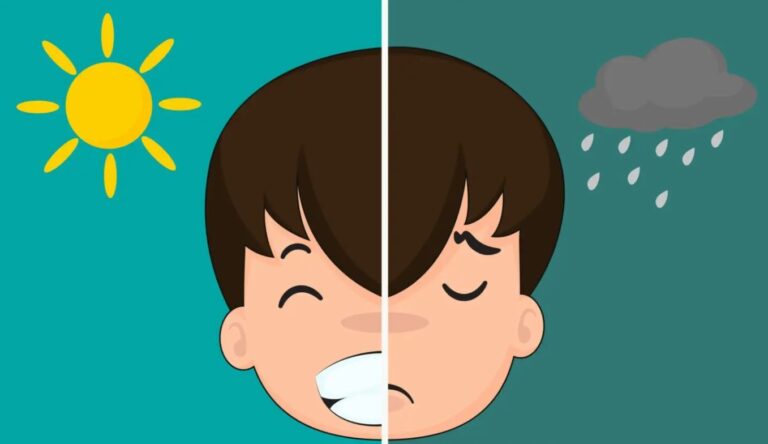Imagine your mind is like a car: sometimes it goes super fast, sometimes it slows down, and sometimes it just cruises along. People with bipolar disorder experience these changes more intensely.
Their “car” can go from super-fast (manic episodes) to very slow (depressive episodes), often without warning. Now, when we talk about “high functioning” bipolar disorder, we’re referring to those whose cars have a special ability.
They can still navigate through daily tasks, work, and relationships even when their mind is speeding up or slowing down more than usual. Although it’s not an official term doctors use, it helps us understand that some people manage their symptoms well enough that their daily life isn’t significantly disrupted.
Key Highlights
- High functioning bipolar disorder describes individuals who manage symptoms well, but still require treatment and support.
- Effective management includes medication, therapy, and healthy lifestyle choices.
- Early intervention and ongoing treatment are crucial for maintaining high functioning status.
- Open conversations and education about bipolar disorder help reduce stigma and support those affected.
The Symptoms
Bipolar disorder is like a mood rollercoaster with high highs and low lows. During manic phases, individuals may feel overly excited, have tons of energy, and sometimes make grand plans that might not make much sense.
In contrast, depressive phases can bring about deep sadness, a lack of interest in fun activities, and even thoughts of giving up on life. These shifts are not just ordinary mood changes but are intense and can affect someone’s life dramatically.
Matthew Boland states: “If your bipolar symptoms don’t notably interfere with your daily life, your healthcare professional might say you’re high functioning.”
Types and Diagnosis
According to Bethany Juby, bipolar disorder comes in several types, with three main ones being recognized:
- Type 1: This type includes full-blown manic episodes, often leading to significant disruption in a person’s life.
- Type 2: Here, individuals experience hypomanic episodes that are less intense than full mania, along with depressive episodes.
- Cyclothymic Disorder: This involves milder fluctuations between hypomanic and depressive states.
To diagnose bipolar disorder, doctors follow criteria from a guide called the DSM-5. It’s like a checklist to help them figure out if someone has bipolar disorder and what type it might be.
Treatment Options
Medication and Therapy
According to John R Geddes and David J Miklowitz treating bipolar disorder often involves two main approaches: medication and therapy.
Medications like lithium or antipsychotics can help balance moods, while therapies, especially cognitive behavioral therapy (CBT), are great for teaching coping skills to manage symptoms effectively.
Lifestyle and Coping Strategies
Adopting healthy lifestyle habits is also crucial. This means maintaining a regular sleep schedule, managing stress, and staying connected with a supportive community.
Coping strategies can include everything from medication adherence to finding creative outlets for expressing feelings.
What Does High Functioning Mean?
Labeling someone as “high functioning” does not mean they don’t experience symptoms. Rather, it indicates that their symptoms don’t significantly hinder their day-to-day life.
However, it’s important to remember that being high functioning doesn’t make the disorder any less real or challenging.
The Importance of Support and Treatment
Even those who are considered high functioning need support and medical attention. Effective treatment can significantly improve the quality of life for anyone with bipolar disorder, helping them to manage their symptoms better and lead a fulfilling life.
The Stigma Surrounding High Functioning Bipolar Disorder
One of the biggest challenges for those labeled as high functioning is the stigma. The term can lead to misunderstandings, suggesting that because someone can manage daily tasks, they don’t struggle or suffer.
This misconception might discourage individuals from seeking help or sharing their experiences, fearing they won’t be taken seriously.
Why It’s Important to Talk About It
Opening up conversations about high functioning bipolar disorder is essential. It helps break down the stigma and acknowledges the spectrum of experiences within bipolar disorder.
Everyone’s journey is unique, and recognizing this diversity is key to providing appropriate support and understanding.
Coping Strategies for Managing Bipolar Disorder
While medication and therapy are cornerstone treatments, coping strategies play a vital role in managing bipolar disorder. Here are some practical tips for those navigating this condition:
- Maintain a Regular Sleep Schedule: Sleep has a profound impact on mood stability. Keeping a consistent sleep routine can help manage symptoms.
- Stay Active and Eat Well: Physical activity and a balanced diet can improve mood and overall well-being.
- Establish a Support System: Having friends, family, or a support group who understand your condition can provide comfort and advice when needed.
- Find Creative Outlets: Activities like writing, painting, or music can be therapeutic and offer a way to express emotions constructively.
- Monitor Mood Changes: Keeping a mood diary can help identify triggers and patterns in mood fluctuations, assisting in managing symptoms more effectively.
The Role of Early Intervention
Catching bipolar disorder early and starting treatment can make a significant difference. Early intervention may help reduce the severity and impact of symptoms, allowing individuals to maintain a higher level of functioning.
It emphasizes the importance of awareness and education about the signs of bipolar disorder and seeking help promptly.
Living with High Functioning Bipolar Disorder
Individuals with high functioning bipolar disorder can lead rich, fulfilling lives with the right treatment and support. It’s a journey that requires understanding, patience, and resilience.
Recognizing the challenges and embracing the strengths of those living with bipolar disorder is crucial for fostering a supportive and compassionate community.
Working With This Condition
The workplace can present unique challenges for those with high functioning bipolar disorder. Balancing professional responsibilities while managing symptoms requires strategy and sometimes, adjustments in the work environment.
Strategies for Success
- Communicate Needs: If comfortable, sharing your condition with HR or a trusted manager can help in making necessary accommodations.
- Flexible Scheduling: Flexible work hours or the option to work from home can alleviate stress and aid in managing mood fluctuations.
- Break Tasks into Manageable Parts: Breaking down larger projects into smaller tasks can help in managing overwhelm and maintaining focus.
FAQs
Can lifestyle changes alone manage high functioning bipolar disorder?
No, while lifestyle changes are beneficial, they cannot replace medication and therapy, which are crucial for managing bipolar disorder.
Does high functioning bipolar disorder get worse with age?
The course of bipolar disorder varies; some may experience more stability with age, while others might see an increase in symptom severity. Regular treatment and monitoring are key.
Can someone with high functioning bipolar disorder have a successful career?
Yes, many individuals with high functioning bipolar disorder lead successful careers, especially with appropriate treatment and workplace accommodations.
Is it possible to mistake high functioning bipolar disorder for just stress?
Yes, its symptoms can sometimes be mistaken for stress or other mental health conditions, underscoring the importance of a thorough evaluation by a mental health professional.
Are people with high functioning bipolar disorder less likely to seek help?
They might delay seeking help due to the perception that they are managing well, but seeking and continuing treatment is crucial for long-term well-being.
Can high functioning bipolar disorder affect relationships?
Yes, despite managing daily tasks well, the emotional and mood fluctuations inherent to bipolar disorder can still impact personal relationships, highlighting the need for open communication and support.
Final Words
High functioning bipolar disorder illustrates that mental health conditions affect everyone differently. While some may face considerable challenges, others can manage their symptoms well enough to lead what appears to be a typical life.
Yet, it’s crucial to recognize the strength and effort it takes to manage such a condition and the importance of ongoing support and treatment to maintain that balance.















